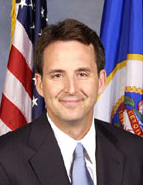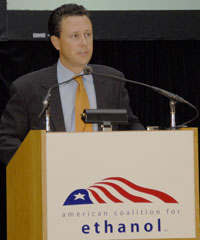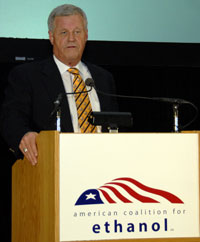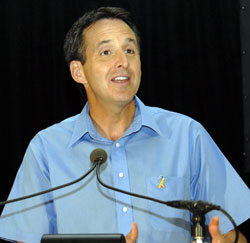 Minnesota Governor Tim Pawlenty has announced a new initiative to move his state from using two percent to 20 percent biodiesel by 2015.
Minnesota Governor Tim Pawlenty has announced a new initiative to move his state from using two percent to 20 percent biodiesel by 2015.
The announcement comes on the heels of yesterday’s word he wants Minnesota to use 20 percent ethanol by 2012 (see Chuck’s post from August 8th). According to HometownSource.com, Pawlenty will bring the proposal before the state legislature next year:
“Minnesota has led the nation in unleashing a renewable energy revolution,” Governor Pawlenty said. “Other states are starting to catch on and it’s time for us to continue to blaze the trail to a cleaner, more secure energy future. Increasing the level of biodiesel in diesel fuel means that more of our energy will come from farm fields rather than oil fields and that’s a good thing.”
The percentage would be phased in over the next seven years, and Pawlenty would also include the requirement that all the biodiesel sold in the state would be BQ9000 certified.


 One of the relatively newer members of the staff of the
One of the relatively newer members of the staff of the  The executive vice president of the
The executive vice president of the  Attendance at the ACE Convention is a record with nearly 2,000 people here over the course of the event. Today is the final day and we’ll have a keynote address from South Dakota Senator John Thune soon.
Attendance at the ACE Convention is a record with nearly 2,000 people here over the course of the event. Today is the final day and we’ll have a keynote address from South Dakota Senator John Thune soon. The Kittitas Valley Wind Power Project got a recommendation from the Washington State Energy Facility Site Evaluation Council for the goveror to OK the project in March. But Governor Christine Gregoire asked the council to consider the feelings of some neighbors in the area who are opposed to the idea.
The Kittitas Valley Wind Power Project got a recommendation from the Washington State Energy Facility Site Evaluation Council for the goveror to OK the project in March. But Governor Christine Gregoire asked the council to consider the feelings of some neighbors in the area who are opposed to the idea.  Developer Smiling Earth Energy LLC and landowner David Peck continue to have different takes on the status of the deal. Peck has said the company defaulted on its purchase agreement after missing two key payments and that the property, in the city’s South Norfolk section, is back on the market.
Developer Smiling Earth Energy LLC and landowner David Peck continue to have different takes on the status of the deal. Peck has said the company defaulted on its purchase agreement after missing two key payments and that the property, in the city’s South Norfolk section, is back on the market. The Chairman of the House Agriculture Committee is Collin Peterson who represents Minnesota’s 7th Congressional District. He took the stage here today at the ACE Convention.
The Chairman of the House Agriculture Committee is Collin Peterson who represents Minnesota’s 7th Congressional District. He took the stage here today at the ACE Convention. Minnesota Governor Tim Pawlenty just finished speaking here at the ACE Convention.
Minnesota Governor Tim Pawlenty just finished speaking here at the ACE Convention. Right now Minnesota Governor, Tim Pawlenty is speaking here at the ACE Convention.
Right now Minnesota Governor, Tim Pawlenty is speaking here at the ACE Convention.